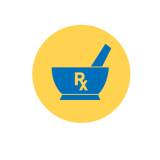Our dedicated Patient Care Consultants (PCCs) are there to help support your patients. See some of the available Pfizer Bridge Program resources below.
 | Benefit verification |
 | Prior authorization assistance* |
 | Appeals assistance* |
 | Copay assistance† |
 | Specialty pharmacy setup |
 | Reauthorization and insurance changes |
 | Benefit verification |  | Copay assistance† |
 | Prior authorization assistance* |  | Specialty pharmacy setup |
 | Appeals assistance* |  | Reauthorization and insurance changes |
Device training and patient resources
 | The GENOTROPIN Starter Kit |  | Device Support Hotline |
 | Device training education with an experienced nurse |
 | The GENOTROPIN Starter Kit |
 | Device training education with an experienced nurse |
 | Device Support Hotline |
| PCCs are available at 1-800-645-1280 |
We are committed to helping with out-of-pocket costs for patients through the GENOTROPIN Copay Program. See terms and conditions below.
By using this offer for the GENOTROPIN Copay Program, you acknowledge that you currently meet the eligibility criteria and will comply with the terms and conditions described below:
- Eligible patients with commercial prescription drug insurance coverage for GENOTROPIN may pay as little $0 per prescription fill. Patient out of pocket expense will vary. The value of this offer is limited to annual benefit of $800-$1,500. Once a patient reaches the annual maximum benefit, patient is responsible for paying the remaining monthly out of pocket costs.
- Patients are not eligible for this offer if they are enrolled in a state or federally funded insurance program, including but not limited to Medicare, Medicaid, TRICARE, Veteran Affairs health care, a state prescription drug assistance program, or the Government Health Insurance Plan available in Puerto Rico (formerly known as “La Reforma de Salud”).
- Patients must have private insurance. Offer is not valid for cash paying patients.
- This offer is not valid when the entire cost of your prescription drug is eligible to be reimbursed by your private insurance plan or other private health or pharmacy benefit programs.
- You must deduct the value of this offer from any reimbursement request submitted to your private insurance plan, either directly by you or on your behalf.
- You are responsible for reporting use of the GENOTROPIN Copay Program to any private insurer, health plan, or other third party who pays for or reimburses any part of the prescription filled using the GENOTROPIN Copay Card as may be required. You should not use the GENOTROPIN Copay Card if your insurer or health plan prohibits use of manufacturer copay cards.
- This copay card is not valid where prohibited by law.
- The benefit under the GENOTROPIN Copay Program is offered to, and intended for the sole benefit of, eligible patients and may not be transferred to or utilized for the benefit of third parties, including, without limitation, third party payers, pharmacy benefit managers, or the agents of either.
- Third party payers, pharmacy benefit managers, or the agents of either are prohibited from assisting patients with enrolling in the GENOTROPIN Copay Program.
- Copay card cannot be combined with any other external savings, free trial or similar offer for the specified prescription (including any program offered by a third party payer or pharmacy benefit manager, or an agent of either, that adjusts patient cost-sharing obligations, through arrangements that may be referred to as “accumulator adjustment” or “copay maximizer” programs).
- Some health insurers or pharmacy benefit managers (or their agents) may have established accumulator adjustment or copay maximizer programs based on the availability of support under the GENOTROPIN Copay Program and/or exclude the financial assistance provided under the offer GENOTROPIN Copay Program from counting towards patient deductibles or out-of-pocket cost limitations.
- Patients subject to an accumulator adjustment or copay maximizer program are not eligible for this offer. Since you may be unaware whether you are subject to an accumulator adjustment or copay maximizer program when you enroll in this offer, Pfizer may monitor program utilization data and reserves the right to discontinue, reduce, or otherwise modify this offer at any time without notice.
- Copay card will be accepted only at participating pharmacies.
- If your pharmacy does not participate, you may be able to submit a request for a rebate in connection with this offer at www.pfizerbridgecopay.com.
- This copay card is not health insurance.
- Offer good only in the U.S. (excluding Puerto Rico, the U.S. Virgin Islands, and Guam).
- Copay card is limited to 1 per person during this offering period and is not transferable.
- A copay card may not be redeemed more than once per 30 days per patient.
- No other purchase is necessary.
- Data related to your redemption of the copay card may be collected, analyzed, and shared with Pfizer, for market research and other purposes related to assessing Pfizer’s programs. Data shared with Pfizer will be aggregated and de-identified; it will be combined with data related to other copay card redemptions and will not identify you.
- Pfizer reserves the right to rescind, revoke, or amend this offer without notice.
- Offer expires 12/31/2026.
- For questions regarding the offer, please call 1-800-645-1280, visit www.genotropin.com, or write GENOTROPIN Copay Program, 430 Mountain Avenue, Suite 105, New Providence, NJ 07974
- Help patients enroll in the Pfizer Bridge Program
- Conduct electronic Benefit Verifications
- Prepare and submit electronic Prior Authorization requests
- Provide e-signatures for GENOTROPIN prescriptions
- Track patient's status and receive notifications
- Access digital forms and resources
Find out more about the Pfizer Bridge Program here